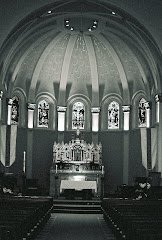Homily on the Liturgy
Week 3: December 19, 2010
WHO DO WE WORSHIP?: GOD INCARNATE
1. At Mass we encounter the God of Glory and Majesty. Since we encounter God, it is the source of all we do as Christians.
A. Since we encounter God at Mass, it also becomes the Summit, the goal of Christian life.
B. As the source and summit of the Christian life, Mass forms us into the body of Christ.
C. I am doing a Homily series on the Mass. We continue to talk about the liturgy today.
2. Last week, we began with the question: Who do we worship? I spoke of God as Trinity: Father, Son and Holy Spirit. When we speak of God in this way he is difficult to understand. He may even seem a little distant.
A. God knows this, so he revealed himself in a much more intimate way. This is what we celebrate at Christmas.
B. The Second divine person of the most holy Trinity was to be born into time and space and take on our human nature. St. John described this as the “The Word became flesh and dwelt among us.”
C. However, we are more familiar with that image of Mary and Joseph in a stable holding a little baby. What is more intimate than a little baby.
D. The mystery of that little baby is called: The Incarnation. This week, when we ask the question ‘who do we worship’ the answer is: At Mass we worship the incarnate God, who took on our human nature.
E. That little baby is the Son, the second divine person of the most holy Trinity. He is fully human. He is also fully God. This is the mystery of Christmas.
3. Remember, Sin separates us from God. There is an infinite gap between God and humanity because of sin. It is impossible for human beings to overcome that gap.
A. In God’s infinite wisdom, God himself goes across that gap. He becomes fully human, and then as both God and human he brings his humanity over the gap and back into heaven at the Ascension.
B. Jesus MUST be God to accomplish this, but then he must be human for us to be redeemed. Only What Jesus became is redeemed.
C. This is what Christianity is all about. It is about the Incarnation. This is why when we say the creed and we come to the Line: “By the power of the Holy Spirit he was born of the Virgin Mary, and became Man” WE Bow. It is that important.
4. The incarnation is also about God revealing himself to us fully. We have no image of “God of Glory and Majesty”. In the Old Testament his presence was in smoke and pillars of fire.
A. They were not even allowed to make image of God because there were NO images to make. God was invisible.
B. But since Jesus is God he was able to say to his disciples: “If you know me, then you will also know the Father.” Then later he said: “Whoever has seen me has seen the Father.”
C. God reveals himself IN HISTORY. God is NOT “Long, long ago in a galaxy far, far away”. Rather, he was born in the days of King Herod, during the reign of Tiberius, when Quirinius was the governor of Syria.
D. People saw him, walked with him, talked with him, touched him, ate with him.
E. Now we have an image of God when we pray: When we pray at Christmas we will imagine the baby Jesus. When we pray with scripture, we imagine Jesus in the story.
F. During Lent, when we pray we imagine Jesus on the cross. We can even imagine Jesus ascending into heaven.
G. With the incarnation, we now have an image of God. This is why early Christians began painting pictures of ‘Jesus the good shepherd’ in their cemeteries.
H. God himself made an image of God: Jesus. So now we human beings also began making pictures of Jesus. We can now imagine what God looks like in our minds, so Christians began to have pictures of him.
5. Today we ask again: When we come to Mass, who do we worship. Yes, we worship God as Trinity: God of Glory and Majesty.
A. But God came into the world. He was born in time and space. He became human. He became one of us. He understands us.
B. He knows what we experience. God is NOT distant, but he is so close he knows us better than we know ourselves.
C. This is important to Mass because he became human. He became part of his creation, which means that CREATION is good.
D. He became part of creation, and so we know that he can use creation for our salvation.
E. When we see Jesus, we see God. That helps us to understand how God works. He will work through things, and he will work through people.
F. Because Jesus became visible, we can now visualize him in art.
G. All of these facts will be important for understanding the Mass.
H. For now know this, Turn to Jesus, look at Jesus, Know Jesus, and you will know the Father. Come, Let us Worship!




